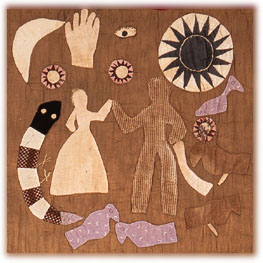Main Menu · Search ·Current Issue ·Contact ·Archives ·Centennial ·Letters to the Editor ·FAQs

 Adam and Eve, the serpent, Adam's rib, God's all-seeing eye, and His merciful hand. Detail of a quilt, made by Georgia seamstress Harriet Powers in 1886. Museum of Fine Arts, Boston. BEQUEST OF MAXIM KAROLIK. COURTESY, MUSEUM OF FINE ARTS, BOSTON
Adam and Eve, the serpent, Adam's rib, God's all-seeing eye, and His merciful hand. Detail of a quilt, made by Georgia seamstress Harriet Powers in 1886. Museum of Fine Arts, Boston. BEQUEST OF MAXIM KAROLIK. COURTESY, MUSEUM OF FINE ARTS, BOSTON |
Consider the black musicians who composed the spirituals and what they made of David. One can understand their theology by seeing which parts of David's story they leave out of their songs, as well as which they put in. "If we had only the spirituals and didn't have the Bible, all we would know about David is that he was a shepherd who played harp, made up great songs, and killed a giant. That's all," says Allen D. Callahan, Ph.D. '92, associate professor of New Testament and early Christian studies at the Divinity School. "The rather unsavory details of the rest of his life that we get in truckloads in the Bible are left out because the composers of the spirituals didn't care about them. So David's a king. So what? So he consolidates Israel's only claim to empire. So what? So he's the scion of the messianic line. So what? The black Americans who composed and sang the spirituals were interested in deliverance, salvation, courage, grace under pressure, and beating the odds. David is the classic underdog. He's small but he beats someone really big. And he can sing. There's nothing else interesting about him."
Callahan is at work on Reading the Talking Book: An Anthology of African- American Biblical Appropriations, to be published by the University of California Press. In their literature, music, drama, painting, and plastic arts, black Americans have drawn on the Bible, and Callahan is gathering samples of such appropriations that are as interesting for their variety as for the history they tell. "The Bible has informed practices of resistance, accommodation, compromise, and resignation," he says. "It exhorted patience in the face of suffering as well as the violent overthrow of an oppressive regime by any means necessary. Martin Luther King Jr. argued for the ballot, and Nat Turner for the bullet--from the same book. Socialists and seamstresses, former cooks (William J. Seymour, holiness preacher in the early 1900s), former seamen (Marcus Garvey), and former hustlers (Malcolm X) ordinarily are hard to come by in scholarly treatments of biblical interpretation, but I include them all here."
Black Americans are using the Bible still, of course. Hear Jesse Jackson, in and out of the pulpit. Hear rapper KRS-One. The Bible has been authoritative for African Americans since colonial times, Callahan says. "Even before they could read it, black folks had an inkling that this book was of great value. A scene in the movie Amistad shows it well. The mutineers are in prison and being tried. One of them takes a Bible from people praying outside the courtroom. The leader, Cinque, says to him, 'You don't have to pretend to be interested in that book.' The fellow says, 'No, I understand it, these people have suffered a lot more than we have.' He turns to a picture of Jesus in the book and says, 'They suffered and then someone came to help them. Look here, he's putting his hands on people and they are healed.' 'What happens to him?' asks Cinque. 'He is executed,' says the friend, 'but he overcomes it, and then he's taken into the sky. This must be what's going to happen to us after they kill us.'"
~Christopher Reed